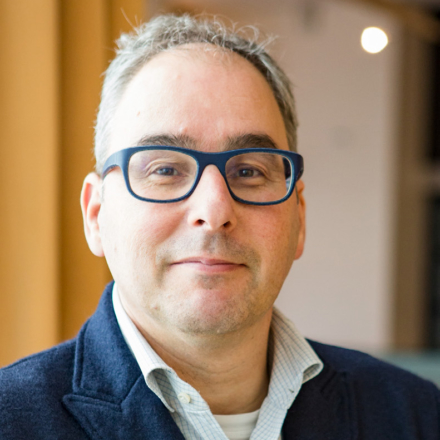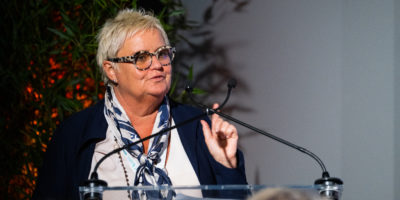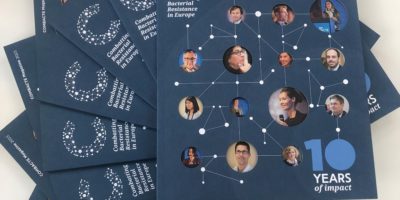“We Take Bigger Steps Together”
For Marc Bonten, COMBACTE is all about collaboration – working together as a team. So he is a bit cautious about being in the spotlight. But it’s impossible to neglect the man who, as a scientific coordinator since the beginning, breathes COMBACTE and now leads the organisation that can be seen as COMBACTE’s long-term successor: Ecraid. We had a conversation with Marc about his views on the impact and lessons learned over ten years of COMBACTE.
What did you learn from COMBACTE?
“Before COMBACTE I thought being a smart scientist is enough to successfully design and execute trials. But these ten years have taught me the complexity of executing trials. Especially with the state-of-the-art research we do. It’s a real multidisciplinary team effort, in which each role is important, beginning with the study lead and up to the research nurse who is talking to patients’ relatives in the ICU. Trials in the field of infectious diseases are now much more solid than ten years ago.”
Looking back on these ten years… what impact comes to mind first?
“At the top of the list is the collaboration we established. Between scientists in Europe, and between pharma and academia. This also resulted in the infrastructure we built for studies on infectious diseases throughout Europe. Like the network of hospitals and laboratories. But also, the network of experts in EPI-Net (epidemiological network) who worked together to improve the understanding of the epidemiology of AMR. It’s this collaboration and infrastructure that is the cornerstone of the new organisation Ecraid. We build on the foundation laid by COMBACTE.”
Can we measure the improvement of COMBACTE on people’s health?
“It’s very difficult to measure such a direct impact. Developing treatments in the field of antimicrobial resistance and infectious diseases takes a long time. That was one of the reasons why COMBACTE was developed in the first place. To encourage pharma to invest in long-term solutions. New treatments are developed step by step. Scientists use publications to take a next step. In this sense we had real impact, with over 150 published articles and other publications. And there is a small number of candidate treatments that are now in phase III trials of which we have good expectations that they will make it to the end.”
How did you experience collaborating with pharma?
“Trust has been built during these years, and there is a wish to continue this collaboration. We aim for the same goals. There were times I had to acknowledge that a pharmaceutical company can have its own agenda, which has not always made it an easy process. In the end the collaboration in general has worked out better than I had expected. Together we are taking bigger steps in the fight against infectious diseases.”

“We must invest in guiding and making room for the younger generations.”
Collaboration seems a keyword in your view on ten years of impact. Is academia ready for it?
“Researchers can sometimes also be seen as competitors. This is due to a system that stimulates doing a small trial on your own more than doing a large trial with a bigger group. Even though a large trial is much more effective. In many countries researchers are judged on their individual publications. This is a serious hurdle for collaboration. But I notice an increasing trend in which people are more open to collaboration. There is a kind of togetherness, an awareness that we can be more successful if we collaborate. REMAP-CAP (Randomised Embedded Multifactorial Adaptive Platform trial for Community-Acquired Pneumonia), for instance, has issued publications without lead authors, but with 200 co-authors – to me this is the new way of working. COVID-19 has also made clear that large trials have much more impact. We’re on a positive path.”
The EU invested in COMBACTE. This means you also had to collaborate on that level.
“Yes, COMBACTE was funded by both industry and public European funds, more specifically the Innovative Medicines Initiative (IMI). We worked together very well. Nathalie Seigneuret has been our IMI Scientific Project Manager all these ten years. I really appreciate her involvement. We had regular contact, and she joined our General Assemblies. Investing in clinical trials was also something new for IMI, and it comes with risks.”
One of the principles of COMBACTE was also diversity. What does that mean? And are you satisfied?
“We wanted to make it a real European project, not only focusing on Western or Eastern Europe. This is especially important because some resistant pathogens are more prevalent in Eastern and Southern Europe. Which is why you need good coverage to include as many patients as possible in different studies. And that is what we did. But diversity also relates to people. The core group that worked on COMBACTE has done so for ten years. More young researchers are now coming in. The balance in terms of age and gender is improving. As the older generation, we must invest in guiding and making room for the younger generations. And we must offer opportunities. This is also something we will facilitate in Ecraid. Young researchers nowadays are much better educated than my generation was. They learned a lot more about clinical epidemiology and data analysis. We need them.”
Related updates

Webinar Combatting Antimicrobial Resistance: The Legacy of the IMI COMBACTE Projects
On May 31st, the Innovative Health Initiative will host an Impact Webinar spotlighting the significant outcomes of the COMBACTE projects in combating ...

COMBACTE's Last General Assembly

COMBACTE Launches Last Magazine
COMBACTE launched its last magazine at ECCMID 2023 in Copenhagen. The magazine focuses on project’s impact, and features articles and interviews with ...